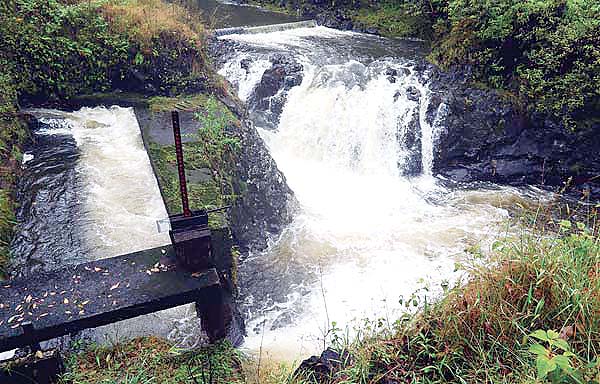Court says permits to divert water from East Maui were ‘not authorized’
March 8, 2022
Melissa Tanji, Staff Writer

The Hawaii State Supreme Court has ruled in favor of East Maui taro farmers and Native Hawaiian practitioners, saying the state’s issuance of revocable permits to divert millions of gallons of water per day from East Maui was “not authorized” under the law.
The opinion from the high court last week said that the permits are subject to the environmental review requirements of the Hawaii Environmental Policy Act.
The court on Thursday remanded the years-old case against the state Board of Land and Natural Resources, Alexander & Baldwin and Maui County back to the First Circuit Court for “further proceedings consistent with this opinion.”
Plaintiffs Healoha Carmichael and Lezley Jacintho, along with Na Moku Aupuni O Ko’olau Hui, a group of taro farmers and Native Hawaiian practitioners, have been battling the defendants over revocable water permits, renewed annually, that allow A&B to divert more than 100 million gallons of water per day from 33,000 acres of ceded lands for agricultural uses Upcountry and Central Maui.
“It’s been a long journey,” Ed Wendt, past president of Na Moku who has been involved in the fight for East Maui water for decades, said in a news release. “Many kupuna have already died waiting for water, for justice. The suffering that our people endured for so long — it’s genocide. But, because of our fight and our legal victories, we are starting to see farmers coming back. We are finally starting to have hope for our next generation.”
For more than a century, the streams of East Maui have been subject to broad-scale commercial diversions as A&B funneled the water into Central Maui for its sugar operations. Since 1985, BLNR has allowed A&B to use state land in East Maui to divert as much as 450 million gallons of water daily by continuously issuing to A&B “temporary” revocable permits without preparing an environmental assessment, according to Native Hawaiian Legal Corporation, which represents the plaintiffs.
In 2015, Carmichael, a gatherer and fisher in Keanae; Jacintho, a taro farmer; and Na Moku Aupuni O Ko’olau Hui sued the state and A&B to end this practice.
“After decades of litigation to address the mismanagement of East Maui’s water resources, today’s Supreme Court decision vindicates the rights of NHLC’s clients, provides clear direction to the Board and empowers the public to hold the state accountable with respect to its public trust resources,” Ashley Obrey, staff attorney for Native Hawaiian Legal Corp., said in a news release Thursday.
BLNR Chairwoman Suzanne Case said many of the issues brought up by the court have already been addressed.
“Although the court did not rule in favor of the State, the court has provided clear language regarding its interpretations and what is expected upon remand,” Case said in an email statement on Monday. “We would note that many of (the) issues discussed in the decision have been resolved by actions that have occurred since the case was put before the court.”
This includes the BLNR’s decision on Sept. 24 to accept an environmental study prepared by Alexander & Baldwin and its subsidiary East Maui Irrigation Co.
The study and its approval, which doesn’t guarantee a lease, proposes a long-term 30-year lease to develop, divert, transport and use government-owned waters, along with the right to be on those state lands to perform maintenance and repairs for existing roads and trails.
The companies are requesting to allow roughly 92 million gallons per day of surface water to be conveyed through the system, with about 85 mgd potentially available for Central Maui agricultural fields, which include Mahi Pono, and 7.1 mgd for Upcountry water customers and the Kula Agricultural Park.
An A&B spokesperson said in an email Monday that “A&B/EMI will comply with the Hawaii Supreme Court’s decision and its remand to the circuit court for further determinations.”
First Circuit Court, where the Hawaii Supreme Court is remanding the case, is the same court that ruled in 2016 that the annual rollover of revocable permits for 13 years by the BLNR was not temporary, as the permits were meant to be, and thus violated state law.
After the Circuit Court ruling in 2016, the state Legislature passed a bill to extend the revocable permit practice until 2019. Another bill that would have extended the practice failed in 2019 after contentious hearings and protests by Native Hawaiian and environmental advocacy groups.
The failure of the bill put A&B’s access to East Maui water in question with its permit set to expire in December 2019.
But in June 2019, the state Intermediate Court of Appeals overturned the 2016 ruling and sent the case back to the lower court. This reopened the door to revocable permits, and in October 2019 BLNR approved another one-year permit for A&B to continue diverting water from East Maui through 2020. In November 2020, the board approved permits again for 2021.
After the appeals court ruling, the plaintiffs in September 2019 asked the state Supreme Court to review the case. The oral argument held on May 5, 2020, was the first ever heard by the Hawaii Supreme Court remotely via videoconferencing.
* Melissa Tanji can be reached at mtanji@mauinews.com.